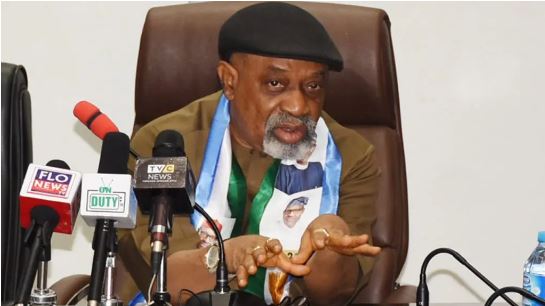Hot Stories
Recent Stories
Ngige, NBS Fight Over Confusing Employment Statistics
Posted by Thandiubani on Fri 30th Apr, 2021 - tori.ngA Twitter fight has ensued between the National Bureau of Statistics and the Ministry of Labour and Employment.

Chris Ngige, Minister of Labour and Employment
The Ministry of Labour and Employment has criticised the National Bureau of Statistics over its methodology in arriving at Nigeria's employment and unemployment statistics.
The issue has led to a fight between the two government departments on Twitter prompting the Minister of Labour and Employment, Senator Chris Ngige to make a statement.
Ngige while receiving leadership of the Chartered Institute of Personnel Management(CIPM) , stated there would be a virtual meeting between the Federal Government and the World Bank.
The meeting, according to the ministry on twitter, is to discuss modalities used by the National Bureau of Statistics(NBS) in gathering data for employment statistics.
Ngige said: “There has been a little confusion there as to the accuracy of data generated by the NBS. So, we want to align everything tomorrow (Thursday).
“The World Bank says the NBS methodology doesn’t conform to the global standard, especially the ILO format of arriving at such Employment Index.”
The Minister, who described the meeting as very important, recalled he had severally queried the employment statistics released by the NBS.
But reacting, the NBS, through its twitter handle, countered the World Bank did not dispute its employment statistics data collection as claimed by Ngige.
It tweeted: “The World Bank has denied making any such statement and rather together with the economic advisory committee affirmed its confidence, commendation, support and close working relationship with @nigerianstat. The World Bank can be contacted if in doubt.”
The friction between the ministry and the agency has sparked outrage on social media.
Many Nigerians recalled the fight between Federal Inland Revenue Service (FIRS) and the Nigerian Postal Service (NIPOST) over collection of stamp duties.
The Nation reports the latest statistics published by the National Bureau of Statistics (NBS) on its website stated the unemployment rate as of the end of 2020 rose to 33.3% from 27.1% recorded as of Q2 2020, indicating that about 23,187,389 (23.2 million) Nigerians remain unemployed.
Top Stories
Popular Stories
Stories from this Category
Recent Stories





















































